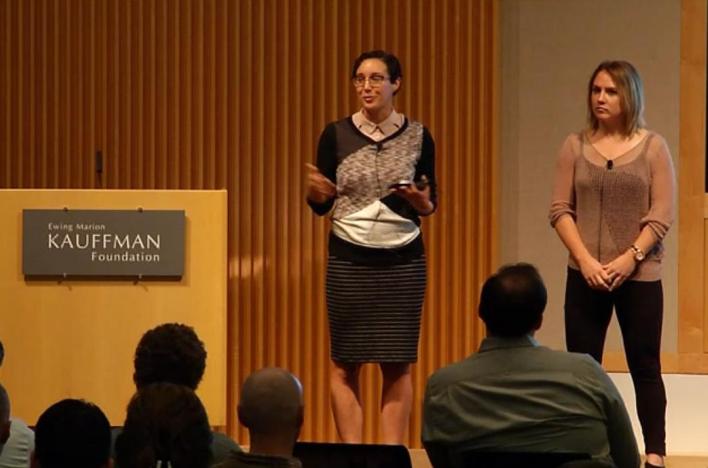This week’s 1 Million Cups at the Kauffman Foundation featured pitches by two nonprofit groups devoted to improving student education and student career-building opportunities.
Starting off were Katie Boody and Carrie Markel, organizers of the Lean Lab, which launched this year to help educate underserved students in the urban core through teaching ventures, fueled by an incubator fellowship program and community events.
Boody, a former middle-school teacher in Kansas City, and Markel, a 2012 Teach for America Kansas City corps member, cited statistics on unsatisfactory student performance, such as that only one in three Kansas City students currently reads at grade level.
“All Kansas City students deserve access to excellent educational opportunities,” Boody said.
The Lean Lab has launched five different student-learning ventures in “high-maintenance” subject areas, and it has three more in the pipeline. The ventures are led by volunteer “fellows” of various backgrounds in cooperation with local schools, businesses and nonprofits. The approaches of each venture can vary, from traditional classroom methods to outside tutoring to technology-driven applications.
The Lean Lab takes its name from the lean startup model and projects that in its first year it will have helped to educate more than 2,000 local students. Parents, students, teachers, entrepreneurs and business leaders are needed to help scale the program’s continuing “community-led innovation in education,” Boody said. “We are in the schools now … We work through the system and innovate with them.”
TriStar
Next up was Mike Saxton, founder of TriStar, a nonprofit educational group that wants to get children interested in STEM (science, technology, engineering and mathematics) by exposing them to operational jet aircraft and related aviation-aerospace professions.
TriStar’s focus is to inspire underprivileged students, with an emphasis on grades three through eight, Saxton said. The former U.S. Navy nuclear engineer emphasized that he wanted to align with local school districts and other educational institutions to help TriStar offer a range of programs to “accommodate different learning needs and opportunities.”
The TriStar curriculum would include a “ground school” to teach the principles of flight. There would also be a “flight experience” utilizing the three jet-engine planes owned by TriStar. Kids would get the chance to tour an aircraft, meet members of its flight crew and be passengers on a round-trip flight with maneuvers—all connecting back to STEM fields, Saxton said.
A “wow” factor for students, Saxton said, would come from being in contact with TriStar’s full-motion flight simulator.
“It’s the biggest, coolest video game out there,” he said, “and it will have a defining appeal to today’s current generation.”


